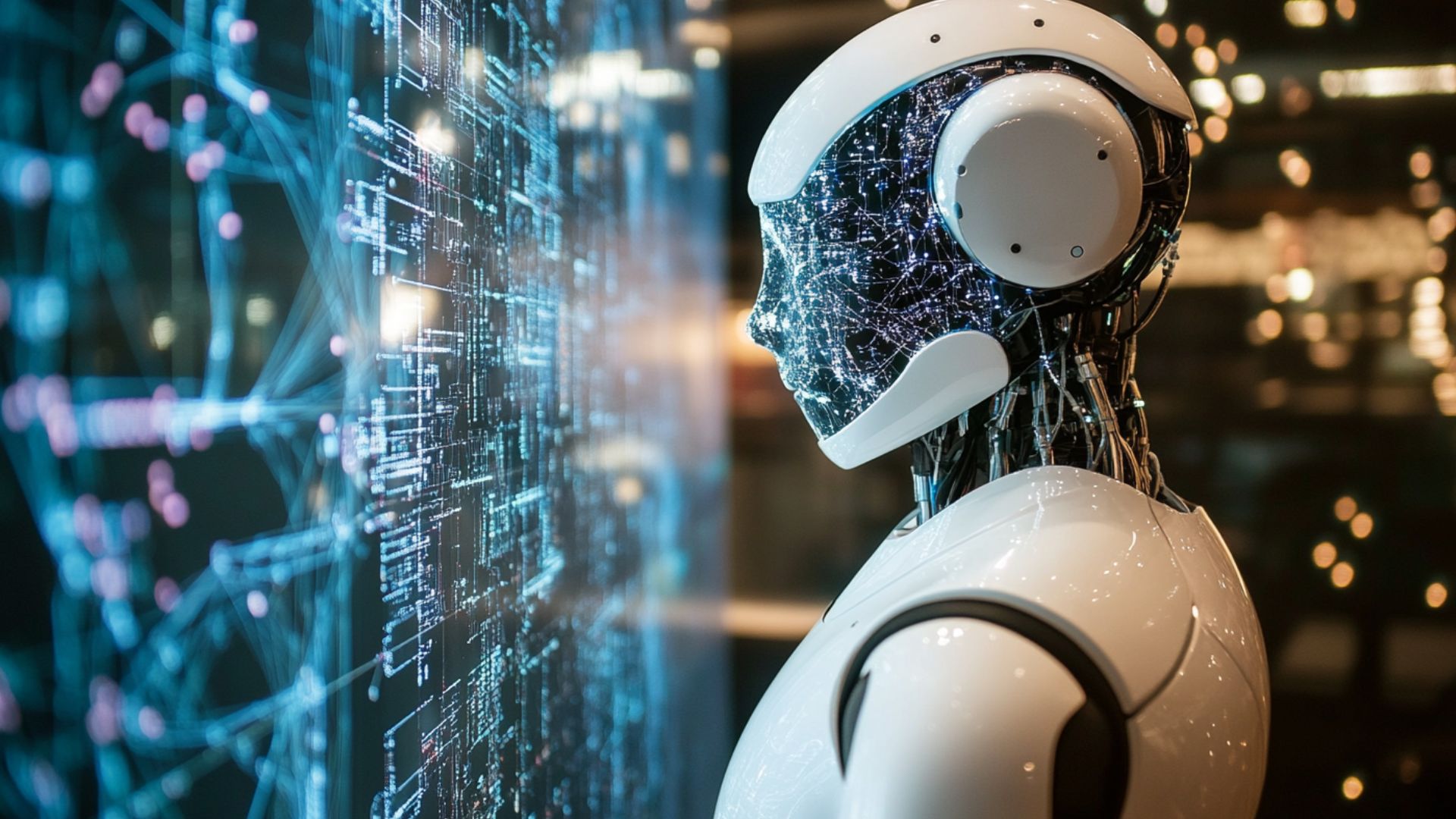Ethics of Artificial Intelligenc

The rapid advancement of AI technologies is creating numerous opportunities worldwide. They start by improving the quality of diagnostics in healthcare. Artificial intelligence (AI) also helps to establish connections between people through social networks. It improves work efficiency. This happens by automating tasks. These rapid changes also raise serious ethical questions. They stem from the fact that AI systems can be biased. They contribute to climate change. These systems can threaten human rights and much more. AI-related risks have already begun to worsen existing inequalities. This results in further harm to already marginalized groups.
AI ethics is becoming increasingly important. It permeates various areas. They are medical, finance, education, and law enforcement. There is AI's growing influence. Ethical concerns match its potential to revolutionize industries. They are about its deployment and use. The ethics debate focuses on ensuring these systems benefit humanity while avoiding harm. Vital ethical questions arise around issues such as privacy, where AI's vast data-gathering abilities may infringe on personal rights.
Understanding AI Ethics: Core Principles
The ethics of AI revolve around several core principles. They guide the responsible development and use of AI technologies. These principles ensure that AI systems align with societal values and human rights:
- Fairness: AI systems must be designed to avoid bias and discrimination. Fairness ensures that AI treats all individuals and groups equitably. It is without reinforcing existing disparities based on race, gender, or other characteristics.
- Transparency: To build trust in AI, we need to make its decision-making processes transparent. Users should have insight into how AI systems function. It includes the data and reasoning behind decisions. They ensure clarity and trust.
- Accountability: With AI systems influencing critical decisions, clear accountability is essential. Developers, organizations, and users must take responsibility for the outcomes produced by AI. They are mainly in high-stakes areas like healthcare or criminal justice.
These ethical guidelines are grounded in these principles. They are crucial for ensuring that AI ethics align with human rights. It promotes technology that benefits society as a whole.
Fairness and Non-Discrimination in AI
Fairness is a crucial aspect of ethics. It helps to ensure that AI systems promote equality. This is rather than reinforcing societal biases. Let's explore why fairness is essential and how biased data can lead to discriminatory outcomes:
- The Need for Fairness in AI: AI systems must prevent bias. Decisions influenced by biased data can perpetuate inequality. Fairness ensures everyone is equitably treated. This is regardless of race, gender, socioeconomic status, or other attributes.
- Biased Data Leading to Discriminatory Outcomes: AI systems trained on unrepresentative data can lead to unfair outcomes. Historical hiring data may reflect a preference for one gender or ethnicity. AI systems may continue to favor those groups, discriminating against others. Algorithms trained on data with fewer diverse faces may perform poorly.
Ensuring fairness is a core principle of artificial intelligence ethics. It helps prevent the amplification of pre-existing societal inequalities.
Transparency and Explainability
Here’s a breakdown of the importance of transparency and explainability in AI ethics. Let's explore it:
| Key Aspect | Description | Importance |
| Transparency | The openness of AI systems in disclosing how decisions are generally made. It also reveals the data used and the processes involved. | Transparency ensures users can understand AI systems. They promote trust, oversight, and accountability. |
| Explainability | The ability of AI systems to provide clear explanations for their decisions and actions. | Explainability is crucial for building trust, especially in high-impact areas. They are healthcare or law. There, users need to comprehend the rationale behind AI decisions. |
| Importance for Ethics | Both transparency and explainability are crucial. It helps align AI technologies with societal values, legal standards, and human rights. | They prevent "black box" systems. There, decisions are generally made without insight. They ensure AI operates ethically and responsibly. |
Both transparency and explainability are foundational principles in the ethics of AI. They enable users, developers, and regulators to hold systems accountable and foster trust.
Ethical Challenges in AI Development

Developers and organizations face several ethical challenges in AI development. They impact how AI systems interact with individuals and society. Here are the key challenges:
- Data Privacy and Security: AI systems rely on large datasets. They often contain sensitive personal information. Ensuring the protection of this data is a primary concern in AI ethics. Breaches or misuse could have significant consequences for individuals' privacy.
- Bias and Discrimination: Ensuring fairness in AI is challenging. Biased data can lead to discriminatory outcomes that perpetuate societal inequalities. Developers must actively work to mitigate these biases.
- Infringing on Rights and Freedoms: AI systems can sometimes violate individual rights. This occurs when surveillance technologies cross boundaries or solutions. They are based on AI and limit access to essential services. These issues prompt one question. Is AI ethical when it affects personal freedoms without transparency or accountability?
Privacy Concerns in AI
AI technologies pose significant privacy concerns. They are doing this because they rely on vast amounts of personal data. Here are the key points:
- Impact of AI on Privacy: AI systems often require large datasets. They include personal information such as location, behavior patterns, and even biometric data. Using such data raises concerns about surveillance, misuse, and unauthorized access. This makes the ethical use of AI a significant priority.
- Data Governance in AI Systems: Effective data governance frameworks are crucial. They help to monitor and regulate personal data collection, storage, and processing. Proper governance aligns AI and ethics. It ensures systems are transparent and accountable in their handling of sensitive information.
- Importance of Privacy Protections: To address these concerns, it’s essential to implement them. They include encryption, anonymization, and consent mechanisms. These measures ensure data is safeguarded and used responsibly. It answers the question of how to use AI ethically.
Accountability and Responsibility in AI Use
Determining accountability in AI systems presents a complex challenge, especially when these systems make impactful decisions. Here are the key points:
- Challenge of Accountability: AI systems can make choices directly affecting people’s lives. They are in healthcare, finance, or criminal justice. This raises questions about who is responsible for these decisions. It complicates the ethical use of AI.
- Liability in AI-Related Harm: Sometimes, AI systems cause some harm. Determining who is liable can be a challenging process. It may be the developers or the organization deploying the AI. Also, it can be another party. Transparent legal and ethical frameworks must address and rectify such situations. They should align with AI and ethics principles.
- Need for Clear Guidelines: Establishing clear guidelines for responsibility and liability is crucial. This includes defining the roles of developers, operators, and organizations. They ensure that AI systems are responsibly and ethically used. Guidelines help address issues when AI-related harm or errors occur, ensuring accountability.
These measures are vital. They ensure that AI technologies are generally developed and used in a particular manner. This is both responsible and fair.
AI Ethics in Practice: Real-World Examples

A table outlines examples of AI ethics and how organizations address these concerns. Let's explore them:
| Industry | Ethical Dilemma | Company Response | Role of Ethics Committees |
| Healthcare | AI misdiagnosis due to biased training data. It leads to unequal treatment. | Implementing bias checks, diverse data sets, and regular audits. | Advising on ethical data use and ensuring systems provide equitable care. |
| Finance | Automated credit scoring systems disproportionately affect marginalized groups. | Developing algorithms to reduce bias. It also enhances transparency in scoring processes. | Guiding fair algorithm design and oversight of financial impacts. |
| Criminal Justice | Predictive policing tools exacerbate racial profiling. | Reviewing algorithms for bias and adjusting deployment practices. They help to minimize harm. | Reviewing ethical implications and recommending adjustments. They help to prevent discrimination. |
Ethics of artificial intelligence in practice involves addressing these dilemmas with thoughtful responses. It also includes guidance from ethics committees to ensure responsible AI deployment.
Ethical Dilemmas in Healthcare AI
There are ethical issues in using AI for healthcare. Let's explore them:
- Patient Consent: It is crucial to ensure patients are fully informed about how AI systems will use their data. Ethical dilemma questions arise about obtaining meaningful consent and respecting patient autonomy.
- Data Security: Protecting sensitive health data from breaches. Misuse is a significant concern. AI systems must adhere to stringent data security protocols. They maintain trust and confidentiality.
Healthcare providers balance innovation and ethics. They do it by:
- Implementing rigorous data protection measures and anonymization.
- Ensuring transparency about AI’s role in diagnosis and treatment.
- Regularly auditing AI systems for fairness and accuracy.
Addressing these concerns ensures that healthcare is generally maintained with respect.
Ethics in AI-Powered Decision-Making Systems
AI is increasingly used in problem-solving roles across various sectors. They are hiring, lending, and law enforcement. The deployment of AI in these areas raises significant ethical concerns. Here are they:
- Hiring: AI systems can influence recruitment by screening resumes or evaluating candidates. What AI ethics are in this context involves ensuring that these systems do not perpetuate biases. It also includes unfair discrimination based on gender, race, or other attributes.
- Lending: AI algorithms are generally used to assess creditworthiness. The ethical implications include potential biases in credit scoring. It could unfairly disadvantage certain groups, impacting their access to financial services.
- Law Enforcement: AI tools for predictive policing or facial recognition can lead to ethical issues. They may reinforce existing biases or lead to unjust profiling. Ensuring transparency and accountability is crucial to mitigate these risks.
Addressing these concerns is essential. They help to align AI decision-making systems with ethical principles and fairness.
The Role of AI Ethics and Governance
There's a growing need to emphasize ethical oversight in AI development and use. Practical AI ethics and governance ensure that AI systems are developed and deployed responsibly. They align with societal values and human rights. Here’s an exploration of the roles involved:
- Policymakers: They are critical in shaping regulations and laws that govern the use of AI. They are responsible for crafting policies that address ethical concerns. These are data privacy, bias, and accountability. Policymakers ensure that AI technologies are responsibly and transparently used.
- Regulators: They enforce compliance with established laws and guidelines. Regulators monitor AI systems to ensure they adhere to ethical standards. They take action against violations. Their role includes evaluating the impact of AI technologies. It involves enforcing corrective measures when necessary.
- Industry Leaders: They are pivotal in establishing ethical standards within their organizations. Industry leaders set internal policies and practices. They promote responsible AI development and use. By leading by example, they influence the broader industry to adopt ethical practices.
- International Cooperation: Creating a global framework for AI ethics requires international cooperation. AI technologies transcend borders. A unified approach helps harmonize standards and practices across countries. Collaboration among nations can develop comprehensive guidelines and best practices. They ensure consistent ethical standards globally.
Stakeholders must integrate these roles and promote ethics in artificial intelligence. They can address ethical dilemmas and foster an environment. There, AI technologies benefit society while minimizing risks.
The Future of AI Ethics: Challenges and Opportunities
The future of AI ethics presents significant challenges and exciting opportunities. Here’s a closer look:
- Future Challenges: AI technology evolves rapidly. It keeps ethical guidelines and regulations up-to-date. This is challenging. AI fast pace can outstrip the ability of existing frameworks to address new moral dilemmas. It raises questions about what are AI ethics in emerging contexts. Increasingly sophisticated systems can make understanding and anticipating their behavior difficult. They complicate efforts to ensure transparency and accountability.
- Opportunities for Ethical AI: This has the potential to reduce biases. They promote fairness across various sectors. These are healthcare, finance, and criminal justice. AI can contribute to a more equitable society by designing algorithms. They actively counteract bias. AI and ethics can support the development of systems that improve access to justice. They are tools for legal assistance or crime prediction. It is transparently and fairly implemented.
- Ongoing Need for Ethical Reflection: AI technologies evolve. Continuous ethical reflection and dialogue are essential. They help to address emerging challenges and adapt guidelines. This ongoing process guarantees that AI systems align with changing societal values and human rights. Adapting ethical basics to new developments in AI technology helps maintain relevance.
AI technologies will develop rapidly. They will significantly affect all areas of life. As AI continues to evolve, staying informed about these ethical considerations will be crucial for everyone.


